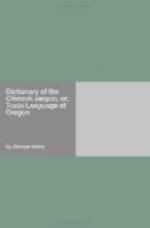Hee’-hee, n. By onoma., HIHI (Hale). Laughter, amusement. Cultus heehee, fun; mamook heehee, to amuse; heehee house, any place of amusement, as a tavern, bowling-alley, &c.
Hoh-hoh, n., v. Chinook (by onoma.), HOKHHOKH. To cough.
Ho-ku-melh, v. Chihalis, idem. To gather; to glean, as grain. Of local use.
Hool-hool, n. Chinook, KHOLKHOL; Klikatat. KHOILKHOIL. A mouse. Eyas hoolhool, a rat.
House, n. English. A house. Mahkook house, a store; Boston house, an American-built house, as distinguished from a lodge.
Howh, interj. HAUKH. Turn to; hurry.
How’-kwutl, adv. Chinook, HAUKATLH. An expression of inability. Ex. Howkwutl nika klatawa? how could I go?
Hul-lel’, v., n. Chinook, idem. To shake. Used with the verb mamook, as, mamook hullel, it becomes active.
Hul-o-i-ma, n., adj. Chinook, S’HULLOYIBA. Other; another; different. Ex. Huloima tilikum, a different tribe or people; hyas huloima, very different.
Humm, n., v. Jargon. A stink or smell; to stink. An invented word. Humm opootsh, a skunk.
Hunl’-kih, adj. Chinook, HUNLKEKH. Curled or curly; knotted; crooked.
Huy-huy, n., v. Canadian French, HUI-HUI. A bargain or exchange; to barter or trade. Ex. Huyhuy la sille, change the saddle; huyhuy tumtum, to change one’s mind. Mr. Andersen says this is a cant word of the Canadians, signifying a hasty exchange. Its origin has been suggested in oui oui, yes yes.
Hwah, or Hwah-wa, interj. Denotes surprise or admiration; also earnestness.
Hy’-ak, adv., also used as imperative. Chinook, AI-AK. Swift; fast; quickly; hurry; make haste.
Hy-as’, adj., adv. Probably corrupted from the following. Large; great; very. The general term for size. Hyas tyee, a great chief; hyas mahcook, a great price; dear; hyas ahnkutte, a long time ago; hyas kloshe, very good.
Hy-iu, n., adj. Nootka, IYAHISH (Jewitt); Tokwaht, AIYA. Jewitt also gives HYO as the name for ten. Much; many; plenty; enough. Term of quantity or multitude. Hyiu tilikum, a crowd; many people; hyiu muckamuck, plenty to eat; tenas hyiu, some; a, few; wake hyiu, not many or not much.
Hy’-kwa, or Hy’-a-kwa, n. Nootka, HAIHWA (i-whaw, Jewitt). The dentalium; the shell money or wampum of the Pacific coast. It is used in strings of a fathom long; shells of not more than forty to the fathom being of full size, and the value increasing in proportion to their length. The smaller sizes are called coop-coop (q.v.). These shells were formerly obtained by the Indians of the west coast of Vancouver Island, and passed in barter as low down as California, and eastward to the Blackfoot country.




